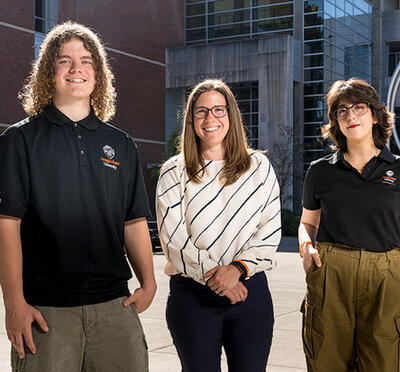Alex Polvi’s career trajectory — from his first job running a chain saw on his family’s Christmas tree farm outside tiny Amity, Oregon, through various student positions in computer science at Oregon State University, to being CEO of a recently acquired Silicon Valley startup — has been nothing short of stratospheric.
Stratospheric seems a fitting term, given the software company that Polvi, 25, and two other OSU Beavers conceived, cofounded, and cashed-out within just two years is called Cloudkick and deals with the stratosphere of cyberspace: cloud computing.
Cloud computing enables companies to utilize the Internet to tap server space, software tools, and other resources on-demand, instead of tying up capital to own computing power, storage solutions, and software that are needed only at certain times. Cloudkick’s product is a set of highly visual and easy-to-use tools that enables system administrators to better monitor, analyze, and manage the resources they use in the cloud.
Polvi, who graduated from OSU in 2007 with a computer science degree, traces his entrepreneurial success back to his time at Oregon State.

It was at OSU that Polvi met two cohorts — Dan Di Spaltro (BS, computer science, 2007) and Logan Welliver (BFA, graphic design, 2006) — who would later become his Cloudkick cofounders, collaborators, and ultimately cohabiters
“The roots of Cloudkick are really at OSU and the Oregon State Open Source Lab,” he says.
It was at OSU where Polvi gained the work experience he now believes was as critical to his success as the courses he took.
As a freshman, he talked his way into a student system administrator position at the OSU Open Source Lab after first being passed over due in part, he thinks, because he showed up for the interview sporting tie-dyed socks. The Open Source Lab job, where lab director Scott Kveton took Polvi under his wing and served as mentor, led to an internship at Google in New York, and then to a real job at Mozilla in the Bay Area after graduation.
It was at OSU where Polvi worked with professor Tim Budd to establish the Open Source Education Lab. “Tim taught me a whole bunch,” Polvi says. “He was very influential and a great mentor.”
And OSU was also the place Polvi pulled off some interesting antics. One summer, he worked with a small team of “fellow geeks who were crazy about Mozilla” to help create a massive crop circle in a field of oats north of Corvallis that depicted the Mozilla Firefox logo (watch the video below). As part of a women studies class project at OSU, he and two female students hung a mock banner on Engineering Row among other banners highlighting outstanding OSU alumni and their achievements. Polvi’s banner featured an OSU alum who had been selected Playmate of the Year by Playboy Magazine.
Polvi says he thrives on new experiences. So it’s no wonder that after a year with Mozilla, he left to launch his own company, which turns out to have been a very worthwhile experience.
In December, 2008, Polvi, Di Spaltro, and Welliver launched Cloudkick, one of the gazillion startups that seem to sprout (and wither) each year in the rich high-tech compost that fills Silicon Valley. But Cloudkick had a solid product, and three smart cofounders who, as Polvi admits, got lucky.
In February of 2009, the company was one of 16 selected by a unique startup incubator called Y Combinator, which gave the starving trio $20,000 in cash, plus access to weekly mentoring sessions with some of Silicon Valley’s finest minds in exchange for a small percentage interest in the company.
“Y Combinator is the brainchild of Paul Graham, a luminary in the hacker world,” Polvi says. “It’s a very different approach to venture funding, which usually involves much larger funds focused on far fewer startups.”
The Y Combinator seed funding and mentoring connections are intended to give a select handful of fledgling startups operating cash for three months, at the end of which they give a six-minute pitch about their company to a roomful of venture capitalists and Silicon Valley brass.
Polvi, Di Spaltro, and Welliver stretched the cash to last eight months, while they scoured the Valley for funding and further developed their product.
“It was 2009, a horrible time to be trying to raise money,” Polvi says. “And we were a very inexperienced team, with no business background.”
But in August 2009, as the trio was running on financial fumes, they finally landed a $750,000 investment from Avalon Ventures. They all moved into a house in San Francisco that served as both home and office (where the Beaver flag was proudly flown), and they hired their first employee, Paul Querna, who had worked with the Oregon State Open Source Lab when he was vice president of infrastructure at the Apache Software Foundation.
Six months later, in February 2010, Avalon Ventures came forward with another infusion of cash for Cloudkick — $2 million this time, a clear indication that the OSU grads were onto something big.

Less than a year later, Cloudkick had grown to 12 employees — six of whom were fellow OSU alumni — plus an OSU intern working remotely from the OSU campus.
One of the key differentiators that set Cloudkick apart from the competition is that their product is highly visual and simple to use. The visual sophistication is thanks to Welliver’s OSU education in graphic design and the time he spent working as the creative director for a Portland web design firm before moving to the Bay Area to join Polvi and Di Spaltro.
Di Spaltro and Polvi shared general management duties. “Dan was responsible for writing a lot of the software, managing the engineering team, working with big customers, dealing with investors, and helping out partners,” Polvi says.
On December 15, 2010, exactly two years to the day from when they founded Cloudkick, Polvi, Di Spaltro and Welliver closed the acquisition deal with Rackspace, the nation’s no. 2 player in cloud computing (second only to Amazon) for an undisclosed amount.
Moving from launch to acquisition in under two years is stratospheric indeed, even in Silicon Valley.
Although they can now all afford to buy homes, Polvi doesn’t own a car and the three cofounders still live together in the San Francisco house, which served as the Cloudkick office until the company outgrew it and rented space at The Farm, a former community center and organic farm that has a reputation for hosting punk rock recording sessions.

What’s next for Polvi? For the near future, he’ll be working for Rackspace, yet another new experience he’s pumped about jumping into.
“Part of the deal with Rackspace was that they wanted a Bay Area presence, so I’ll be managing the opening of their San Francisco office,” Polvi says.
He says it will be nice to have access to the resources at San Antonio, Tex.-based Rackspace, which employs 3,500 people and is valued at approximately $4 billion.
“Rackspace will be working to secure its spot as a world leader in cloud computing,” says Polvi. “And I’m excited about helping them get there.”
Beyond that, who knows? “I love new experiences that ultimately help people,” he says. “At the end of the day, I think that’s what it’s all about — helping people. That’s what we did at Cloudkick, created a tool that helps people do their job better. And that’s what I’ll be doing at Rackspace.”
One of the immediate ways Polvi hopes to help others is by hiring more OSU alumni and interns at Rackspace’s new San Francisco digs. “We’re hiring interns all the time, so if you want to work with a bunch of other Beavers, get in touch,” he says, acknowledging that the Beaver flag will definitely be flying at the new office space.
“If you enjoy what you’re doing, work is life,” he says.




